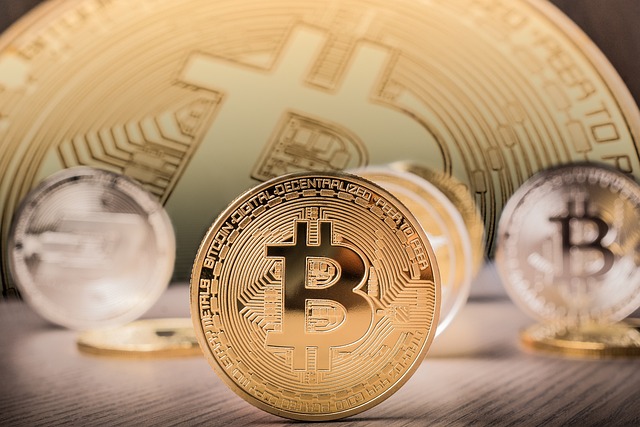Decentralized Finance Defined: Beyond the Buzzwords
Decentralized Finance Defined: Beyond the Buzzwords

What is Decentralized Finance?
Decentralized Finance (DeFi) is a revolutionary approach to traditional financial systems that aims to democratize and decentralize financial services. Unlike traditional finance, which relies on centralized intermediaries like banks and financial institutions, DeFi operates on blockchain technology, making it transparent, secure, and accessible to anyone with an internet connection. In DeFi, financial transactions such as lending, borrowing, and trading are executed using smart contracts, eliminating the need for intermediaries and enabling peer-to-peer transactions.
One of the key characteristics of DeFi is its open and permissionless nature.

Why is Decentralized Finance important?
Decentralized Finance, or DeFi for short, has gained significant traction in recent years, and for good reason. Its importance lies in its potential to revolutionize traditional financial systems by utilizing blockchain technology. One of the key reasons why DeFi is important is its ability to provide financial services to individuals who are excluded from the traditional banking system. In many parts of the world, people face barriers such as lack of access to bank accounts or high fees for basic financial services. DeFi has the potential to break down these barriers by allowing anyone with a smartphone and an internet connection to access a wide range of financial services, such as savings, loans, and investments, without the need for a middleman.
Moreover, the decentralized nature of DeFi eliminates the need for intermediaries like banks, which can often be slow, expensive, and prone to corruption. By leveraging blockchain technology, DeFi allows for peer-to-peer transactions, cutting out unnecessary fees and reducing the time and complexity involved in moving money. This is particularly important in regions where the cost of transferring funds across borders can be exorbitant, hindering economic growth and hindering financial inclusion. Furthermore, DeFi’s reliance on smart contracts ensures transparency and immutability, providing increased security and trust in financial transactions. Overall, the importance of DeFi lies in its potential to democratize financial services, making them accessible to the masses and empowering individuals to have greater control over their own financial destinies.
The Role of Blockchain Technology in Decentralized Finance
Blockchain technology plays a crucial role in decentralized finance, revolutionizing the way financial transactions are conducted. By using a decentralized and transparent ledger system, blockchain removes the need for intermediaries and creates a more efficient and secure financial ecosystem. This technology has the potential to enhance trust and reduce costs in various financial processes such as lending, borrowing, investing, and even insurance.
One of the key advantages of blockchain in decentralized finance is its ability to eliminate the need for a centralized authority to verify and process transactions. Instead, all transactions are validated and recorded on a distributed network of computers, making them tamper-proof and significantly reducing the risk of fraud. Additionally, the transparency of blockchain allows for real-time visibility into transactions, ensuring that all parties involved have access to accurate and reliable information. With these benefits, blockchain technology opens up new opportunities for financial inclusion and empowers individuals who may not have access to traditional banking services.
The Benefits of Decentralized Finance
Decentralized finance, also known as DeFi, has been gaining significant attention in recent years, and for good reason. One of the key benefits of decentralized finance is the opportunity it provides for financial inclusion. Traditional financial systems often leave out a significant portion of the global population, particularly those in underserved communities or without access to banks. However, with decentralized finance, anyone with an internet connection can participate in financial activities, such as lending, borrowing, trading, and investing, without the need for intermediaries.
Another important benefit of decentralized finance is the increased transparency it brings to financial transactions. In traditional finance, most transactions are recorded and controlled by centralized authorities, leading to a lack of transparency and trust. However, with blockchain technology as the underlying infrastructure for decentralized finance, every transaction is recorded on a public ledger that is accessible to all participants. This transparency not only reduces fraud but also empowers individuals to have more control and trust over their own financial activities.
The Challenges and Risks of Decentralized Finance
Decentralized finance, or DeFi, has gained significant attention in recent years as an alternative to traditional financial systems. While it promises numerous benefits, such as greater financial access and increased transparency, it also comes with its fair share of challenges and risks. One notable challenge is the risk of scams and fraudulent activities. Due to the decentralized nature of DeFi, it can sometimes be difficult to verify the legitimacy of certain projects and investments.

Another significant challenge faced by DeFi is the issue of regulatory compliance. Unlike traditional financial institutions, DeFi platforms often operate across geographical boundaries, making it challenging for governments and regulatory bodies to enforce regulations. This lack of oversight can potentially lead to money laundering, market manipulation, and other illicit activities. Additionally, the absence of clear regulatory frameworks can deter institutional investors from participating in DeFi, limiting its potential for growth and adoption.
Despite these challenges, the DeFi ecosystem also faces specific risks. Smart contract vulnerabilities, for instance, pose a significant risk. Smart contracts are self-executing agreements coded on the blockchain, and any bug or vulnerability in the code can lead to exploitations and the loss of funds. Furthermore, the volatility of cryptocurrencies, which form the backbone of most DeFi platforms, introduces an inherent risk. Fluctuations in the value of cryptocurrencies can lead to significant losses for users, especially when leveraging their positions or engaging in speculative activities.
In conclusion, while decentralized finance holds immense potential for revolutionizing the financial industry, it is not without its challenges and risks. Scams and fraudulent activities, regulatory compliance, smart contract vulnerabilities, and cryptocurrency volatility are among the key issues that need to be addressed for the sustainable growth of DeFi.

Key Components of Decentralized Finance
The key components of decentralized finance (DeFi) are the building blocks that make this revolutionary concept possible. Smart contracts play a crucial role in the DeFi ecosystem. These self-executing contracts are coded on blockchain platforms like Ethereum and ensure that transactions are automatically executed when certain conditions are met. Smart contracts eliminate the need for intermediaries, making transactions faster, cheaper, and more transparent. They also enable the creation of complex financial products such as decentralized lending and automated market makers.
Another essential component of DeFi is decentralized exchanges (DEXs). These platforms allow users to trade digital assets directly with one another without the need for a centralized authority. By removing the middlemen, DEXs provide greater privacy and security for users, as well as resisting censorship and regulation. Additionally, decentralized oracles are integral in providing real-world data to DeFi platforms. Oracles act as bridges between the blockchain and external sources, ensuring accurate and timely information for various DeFi applications such as price feeds and insurance policies. These key components together enable the creation of a permissionless and inclusive financial system that empowers individuals and breaks down traditional barriers.
• Smart contracts: Self-executing contracts coded on blockchain platforms like Ethereum
– Automatically execute transactions when certain conditions are met
– Eliminate the need for intermediaries, making transactions faster, cheaper, and more transparent
– Enable the creation of complex financial products such as decentralized lending and automated market makers
• Decentralized exchanges (DEXs): Platforms that allow users to trade digital assets directly with one another without a centralized authority
– Provide greater privacy and security for users
– Resist censorship and regulation
• Decentralized oracles: Bridges between the blockchain and external sources providing real-world data to DeFi platforms
– Ensure accurate and timely information for various DeFi applications such as price feeds and insurance policies
These key components work together to create a permissionless and inclusive financial system that empowers individuals by breaking down traditional barriers.
Exploring Decentralized Lending and Borrowing
Decentralized lending and borrowing have emerged as crucial components of the rapidly growing field of decentralized finance (DeFi). With the advent of blockchain technology, individuals now have the opportunity to participate in lending and borrowing activities without the need for intermediaries such as banks or traditional financial institutions. This shift introduces a new level of accessibility, transparency, and efficiency to the lending and borrowing landscape.
One of the key advantages of decentralized lending and borrowing is the elimination of the need for trust in counterparties. Through the use of smart contracts, borrowers can secure loans directly from lenders without the need for traditional credit checks or cumbersome paperwork. This opens up opportunities for individuals who may have been previously excluded from accessing loans due to limited credit history or geographical limitations. Moreover, lenders can earn interest on their funds by providing liquidity to the lending platforms, thus creating a mutually beneficial ecosystem for both borrowers and lenders.
The Rise of Decentralized Exchanges
Decentralized exchanges (DEXs) have gained significant attention and popularity in recent years. These platforms offer a unique and innovative solution to the centralized nature of traditional exchanges. Unlike centralized exchanges that rely on intermediaries to facilitate transactions, DEXs enable users to trade digital assets directly with one another.
One of the key advantages of decentralized exchanges is their enhanced security and transparency. Since transactions are executed on a blockchain, there is no need to trust a central authority to hold and secure funds. This decentralized nature reduces the risk of hacks and thefts, providing users with greater peace of mind. Additionally, the transparent nature of blockchain technology allows users to verify and track all transactions, enhancing trust in the platform. As a result, DEXs have emerged as a viable and secure alternative to their centralized counterparts in the cryptocurrency market.
Decentralized Finance and Financial Inclusion
Decentralized finance has the potential to revolutionize traditional financial systems by promoting financial inclusion. With its decentralized nature, it removes the need for intermediaries like banks, making financial services more accessible to those who are unbanked or underbanked. By leveraging blockchain technology, decentralized finance allows individuals to have full control over their finances and participate in transactions without requiring a centralized authority to oversee and approve them.
Financial inclusion, on the other hand, aims to provide equal access and opportunities to financial services for all individuals, regardless of their socioeconomic background. This is especially crucial for marginalized communities that have historically been excluded from the formal financial system. By embracing decentralized finance, these individuals can now participate in activities such as lending, borrowing, and trading, which were previously out of reach. Additionally, decentralized finance opens up avenues for microfinance, enabling small-scale entrepreneurs and individuals with limited resources to access capital and build livelihoods. Overall, the combination of decentralized finance and financial inclusion has the potential to empower individuals and foster economic growth by creating a more inclusive and equitable financial system.
The Future of Decentralized Finance
As we look to the future of decentralized finance, one can’t help but imagine a landscape that is more inclusive, efficient, and accessible for everyone. The potential of blockchain technology to revolutionize traditional financial systems and empower individuals is truly remarkable. With decentralized finance, we can envision a world where people have greater control over their assets, transactions are faster and cheaper, and financial services are available to anyone with an internet connection.
One exciting aspect of the future of decentralized finance is the potential for greater financial inclusion. Currently, many individuals around the world lack access to basic financial services like banking and lending. However, with decentralized finance, these barriers can be overcome. By leveraging blockchain technology, individuals can access a wide range of financial services without the need for intermediaries or traditional banks. This opens up a world of possibilities for those who are currently underserved by the existing financial system, allowing them to participate in the global economy and improve their overall financial well-being.
In conclusion, the future of decentralized finance holds immense promise. It has the potential to reshape the way we think about and engage with financial systems. While there are still challenges and risks to overcome, the benefits of decentralized finance are clear. From greater financial inclusion to improved efficiency and accessibility, decentralized finance has the potential to transform the lives of individuals and communities around the world. As we continue to explore and develop this exciting field, it’s crucial that we embrace innovation and collaboration to unlock the full potential of decentralized finance.
What is Decentralized Finance?
Decentralized Finance, or DeFi, refers to a financial system built on blockchain technology that aims to provide open and permissionless access to various financial services, such as lending, borrowing, and trading, without the need for intermediaries like banks or traditional financial institutions.
Why is Decentralized Finance important?
Decentralized Finance is important because it has the potential to democratize access to financial services, enable borderless transactions, and eliminate the need for intermediaries, which can reduce costs and increase efficiency. It also promotes financial inclusivity and empowers individuals to have more control over their own finances.
What is the role of Blockchain Technology in Decentralized Finance?
Blockchain technology plays a crucial role in decentralized finance by providing secure and transparent transactions, immutability of data, and the ability to create smart contracts. It allows for the creation of decentralized applications (DApps) that can automate financial processes and remove the need for trust in third parties.
What are the benefits of Decentralized Finance?
Decentralized Finance offers several benefits, such as lower transaction fees, increased financial accessibility, enhanced privacy, faster and more efficient transactions, permissionless access to financial services, and the ability to earn passive income through various decentralized lending and staking platforms.
What are the challenges and risks of Decentralized Finance?
Some challenges and risks of Decentralized Finance include smart contract vulnerabilities, scalability issues, regulatory uncertainties, potential for hacks or exploits, lack of investor protection, and the need for users to have a good understanding of the technology to avoid pitfalls.
What are the key components of Decentralized Finance?
The key components of Decentralized Finance include decentralized lending and borrowing platforms, decentralized exchanges, decentralized stablecoins, yield farming platforms, decentralized insurance protocols, and various other decentralized financial services and applications.
Can you explain decentralized lending and borrowing?
Decentralized lending and borrowing platforms allow individuals to lend their cryptocurrencies and earn interest, or borrow cryptocurrencies by using their own assets as collateral. These platforms use smart contracts to automate the lending and borrowing process without the need for intermediaries, enabling individuals to access funds or earn passive income.
What is the rise of decentralized exchanges?
Decentralized exchanges, or DEXs, are platforms that facilitate the trading of cryptocurrencies directly between users without the need for intermediaries or centralized control. They provide greater privacy, security, and control over funds compared to traditional centralized exchanges, and they are gaining popularity due to their transparent and permissionless nature.
How does Decentralized Finance promote financial inclusion?
Decentralized Finance promotes financial inclusion by providing access to financial services for individuals who are unbanked or underbanked. It eliminates the need for traditional identification and credit checks, allowing anyone with an internet connection and a cryptocurrency wallet to participate in various financial activities, regardless of their location or financial status.
What does the future hold for Decentralized Finance?
The future of Decentralized Finance looks promising. We can expect to see further innovation, increased adoption, and the development of more sophisticated decentralized financial products and services. As the technology matures and scalability improves, Decentralized Finance has the potential to revolutionize the traditional financial system and reshape the way we think about money and banking.
Todays Featured Product:
Buy, exchange and grow your crypto securely with a Ledger hardware wallet, combined with the Ledger Live app. It’s never been easier to keep your crypto safe and accessible. Buy direct from Ledger.com and get todays Special Offers Here.




